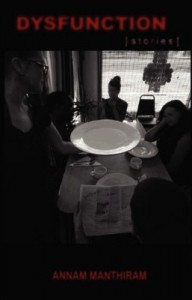 Dysfunction
Dysfunction
by Annam Manthiram
Aqueous Press, December 2012
170 pages / $14 Buy from Amazon or Aqueous Press
The dysfunctional nature of many of the characters that populate Annam Manthiram’s Dysfunction only serve to highlight their strange humanity. Throughout, “Variations on a Blossoming Marriage,” we are treated to an alphabetical catalog of failed relationships. The description for Calla Lily is poignantly emblematic of a plight the characters share: “He liked white— white everything. White sheets, white toothpaste, even white curry. I didn’t know how to make white curry. Everything I touched turned brown.” The clash of tactile expectation versus the moment of actual contact is the intersection that the stories hinge on and that fulcrum becomes more pronounced with the cultural context denoted by brown.
In “Asha Ma,” we are taken through the life of a young Indian woman. From the moment she is born, there is an invisible gauge against which her life is measured. When she fails to match the barometer her mother hoped for during a ritual performed for her first birthday, she is deemed “inauspicious” and “a sacrilege.” The irony is that, of course, a simple baby game intended for playful festivities takes on religious connotations that would haunt her life. In high school, she is often mistaken for another Indian student named Cynthia. When Cynthia takes time off from school due to chicken pox, Asha masquerades as Cynthia, and in a sad commentary on racial stereotypes, the other students can’t tell the difference. No expected fallout happens upon Cynthia’s return, who simply refers Asha to the principal and he in turn to a therapist. Neither of them can help her find what she wasn’t able to track down for her birthday ritual; her identity, mainly because the given categories didn’t fit. A disconnected relationship happens with her co-worker, Joe, whom she both attracts and repels. It ends when she makes out with a stranger at a party Joe invited her to (more specifically, the stranger licks her clavicle). Again, there is no blowout, no jealous outrage by Joe. Instead, he falls for another woman at the office and moves on. The story reaches its denouement with a sordid revelation of a past affair from her parents that causes Asha to come to terms with her absent self. The ending consists of self-discovery in defying self-discovery. Pat epiphanies about ‘place in the world’ are replaced by acceptance of the void of simple being and the climax defuses itself similar to the other encounters in the story.
Being takes a step back to a life lesson in “Pancake Race” which is set to the backdrop of Liberal’s Pancake Day race and a young boy’s childhood crush. His mother is busy preparing to run a 415-yard race against the other wives in town. The young lady in question, Rumi, is invited over along with her mother. He tries to steal a moment with her in his tree house, only to learn she might be moving back to India. A discussion on knives takes a dark turn when Rumi asks:
“Have you ever cut yourself?”
“Once, when I was helping my father chop wood for the fire place.”
“No, I don’t mean on accident. I mean on purpose.”
Their brief interlude is interrupted by Rumi’s mother, though the insinuations into the dark abscesses of his crush subtly affect his crumbling innocence. Shortly afterwards, his mother in a moment of doubt, ponders her chances for victory:
He assures her that she can win, although he later confesses, “I doubted it though.” In this case, the lesson wasn’t some happy resolution to tie the family together, but instead, a lie to assure a mother to prevent her from inflicting mental knife wounds.
Games, victory, and life are interconnected within the stories, particularly in a mortal game of carrom in “Golconda, India 1686” which sticks out as one of the most distinctive tales in the collection for its fascinating blend of history and gaming (a topic that is a personal favorite). The heroine is a daughter of the Sultan of the Qutb Shahi Dynasty who excels at both carrom and love-making. She is wed to a man named Abdullah who offers protection against a foreign army, though his principal intent turns out to be betrayal and taking over the Dynasty himself. While survival for her father and her own life seem beyond hope, she wages it all in a game of carrom. At one point, the princess knows that had her mother been alive, it would never have reached that point and in reflecting candidly upon her, she muses:
Dysfunction fights hard to make semblance of a nonfunctional world. The characters are as broken as the tattered clockworks around them that force them into their grinding place. The ebb of their longing is stemmed by factors outside of their control which makes at times for a difficult read with its authentic stories that expose the bitter hollows of living. Even survival sometimes eludes them and it’s the struggle for identity that gives them grease for their creaky, existential chains that disturbingly lack answers. And function.
***
Peter Tieryas Liu is a dysfunctional human being. In a moment of functionality, he typed out a collection of short stories called Watering Heaven for Signal 8 Press, but then broke back down again. He occasionally blogs at tieryas.wordpress.com
Tags: Annam Manthiram, Dysfunction, Peter Tieryas Liu

[…] http://htmlgiant.com/reviews/dysfunction/ […]
http://tinyurl.com/kwgl7yv.